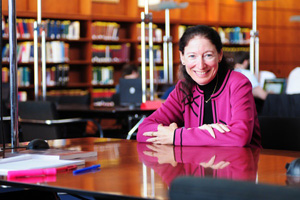
In the 1957 film adaptation of the play 12 Angry Men, actors Lee J. Cobb and Henry Fonda, as jurors No. 3 and No. 8, convey the polar opinions that can comprise jury trial deliberations:
“You’re talking about a matter of seconds. Nobody can be that accurate,” says Cobb, about an eyewitness’s account of the crime.
“Well, I think that testimony that can put a boy into the electric chair should be that accurate,” counters Fonda.
Nancy S. Marder, professor of law at IIT Chicago-Kent College of Law, has watched the movie 16 times, showing it each year in her law school course called Juries, Judges, and Trials. She also served as symposium editor of “The 50th Anniversary of 12 Angry Men,” published in the Chicago-Kent Law Review. The symposium is one of several on juries she has selected as resources offered through a new online informational clearinghouse she is creating called the Jury Center.
Her deep and long-time interest in juries goes back to her first year as a student at Yale Law School and the strong impression made on her by a professor who favored bench trials over jury trials. She went on to publish her first piece at Yale on the topic of juries and gender dynamics and had opportunities to work on cases that pertained to juries as a law clerk in a federal district court, a court of appeals, and finally, for Justice John Paul Stevens at the U. S. Supreme Court.
The idea for a jury clearinghouse came to Marder several years ago when she could not find one centralized website for jury information and grew increasingly frustrated with sites that only featured articles that were not current.
“I see the Jury Center as being a broadly defined public service,” she explains, adding that academics, students, the media, and interested citizens could all benefit from visiting the site. “It would be one way to make available a lot of information such as current scholarship, new developments, and upcoming conferences—all pertaining to the jury.”
Working with third-year law student Amanda Schackart, Marder began constructing the site in fall 2009. It features annotated bibliographies of journal articles on comparative jury systems, the history of juries, jury behavior, jury selection, and public policy; published symposia; and links to other jury resources, such as the American Judicature Society. For the future, Marder is looking to involve the Jury Center in an empirical study, which would provide a real-world plus to Illinois jurors by helping to shape practice and redesign procedures.
Marder says that a current topic of interest is the growing number of countries that want to encourage citizens’ participation in the justice system and are considering the jury as one way to do so.
“Jury trials remain important,” says Marder. “People take very seriously their right to a jury trial in this country.” She hopes this growing international interest in the jury will mean that the new Jury Center will provide valuable information for people across the globe.